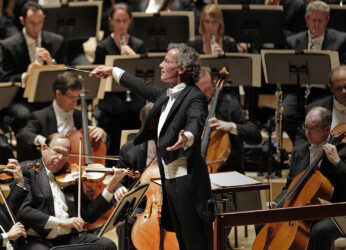
 Germany Musikfest Berlin 2022 [4] – Rihm, Schubert: Cleveland Orchestra / Franz Welser-Möst (conductor). Philharmonie Hall, Berlin, 3.9.2022, and livestreamed on Digital Concert Hall. (GT)
Germany Musikfest Berlin 2022 [4] – Rihm, Schubert: Cleveland Orchestra / Franz Welser-Möst (conductor). Philharmonie Hall, Berlin, 3.9.2022, and livestreamed on Digital Concert Hall. (GT)

Wolfgang Rihm – Verwandlung 3; Verwandlung 2
Schubert – Symphony No.8 in C major, D 944 ‘Great’
This programme was the second following the Cleveland Orchestra’s opening concert in Amsterdam, and the first here after six years of absence in Europe. Franz Welser-Möst – starting his twenty-first season as Music Director of this great American orchestra – brought an ingenious programme. It would be perhaps enough to have one piece by Wolfgang Rihm but to play two could be considered a challenge – but then this is the composer’s seventieth birthday year, and wholly appropriate to share this programme with one of the great Romantic composers.
Of course, Rihm has played the part of Franz Schubert in a film about the composer and has been influenced by romantic music uniquely introducing styles and ideas in his composition. Rihm’s Verwandlung 2 is based on themes from Mahler, while Verwandlung 3 is largely from Schreker (Verwandlung means ‘Metamorphosis’).
The opening of the Verwandlung 3 started with an eruption of sound somewhat hinting at Richard Strauss from his most adventurous period – and there were vivid solos from the bassoon of John Clouser, and Peter Otto on the violin, and the oboe of Frank Rosenwein – before an intense passage from the strings which became overdramatic before we heard an intriguing idea from the two flutes and a Wagnerian theme on the horns. The eloquent clarinet of Afendi Yusuf introduced a lively idea before a culminating crescendo and the quiet close.
Verwandlung 2 began on the first violins, and then we heard a mysterious flute theme from Jessica Sindell accompanied by a muted trumpet before an energetic passage on the strings. Then a weighty sequence in the flutes, oboes and solo violin was interrupted by the brass which invoked imagery of a great beast awakening followed by a sequence of stillness interrupted by the percussion and brass before closing on a dramatic chord of E flat major.
In the second half of the concert, there were noticeably more seats filled than in the first half. For the Schubert symphony, the opening Andante – Allegro ma non troppo began with the beautiful entry of Nathaniel Silberschlag on the horn backed by gorgeous strings, and there was a charming oboe tune from Rosenwein in a softly measured tempo. Here the conductor – from his facial expressions – seemed to be enjoying this music more than he did in the first half. There was wonderfully bright brass playing, especially from the lovely trombones, and there appeared a steady acceleration in the tempo – this was superlative playing.
In the Andante con moto there was a lovely invocation as if one was walking through a rustic scene. It was marvellously characterised by Rosenwein’s eloquent oboe and with the woodwind playing gracefully, bringing out all the pastoral harmonies of the music. This was notably emphasised by the clarinet of Yusuf and the delightfully divine violins against the exhilarating golden-hued brass – and then a pause ever so gently handled by Welser-Möst. Here in his reading, every note, every phrase, seemed as if it had been minutely cleaned and polished and was heard here anew and fresh!
The Scherzo. Allegro vivace was performed as a scherzo should be, it was stunning, colourful, dynamic and exciting, with the flutes of Saeran St. Christopher and Joshua Smith to the fore. Here again was delightful playing, with singing phrasing and the bloom of the strings giving a transparency and colour to the harmonies of the Trio – another musical feast of delights. The Finale – Allegro vivace opened with the breathtakingly exciting entry on the horns and woodwind of Schubert’s gloriously developing theme. Again, we heard masterly playing from the oboe of Rosenwein with an enigmatic idea against thrilling string playing before an emotive rise in the drama. Sometimes one tires of hearing the repeats, but here one wanted them to go and on, so wonderful was the standard of the music making. This was a terrific performance of a very familiar symphony, yet here it sounded as fresh as the day it was written.
Gregor Tassie
